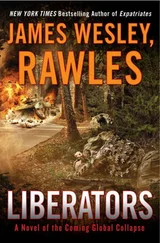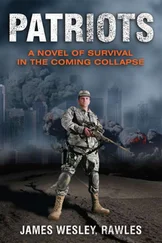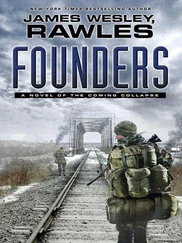The guard whispered a code phrase on a handie-talkie, and ten seconds later the electric gate opened. Lars drove up to the plant’s administrative office, a nondescript windowless concrete slab tilt-up building that looked recently constructed. He stepped out of the cab and slung his Valmet across his back.
To Lars, the building looked normal except that he could see a parapet of sandbags at one corner of the roof. And then as he approached the building he noticed the front door, which had probably originally been glass, had been replaced with what appeared to be plywood, painted dark gray to match the building.
A neatly printed sign with an arrow read, “Press buzzer and identify yourself. Door is heavy: Pull hard!” Lars pressed the button and looked up at a CCTV camera. “Major Lars Laine.” A moment later a buzzer sounded and Laine pulled the door open. It was indeed very heavy. As he swung it open, he could see that the plywood was just a veneer, covering an unpainted sheet of half-inch-thick plate steel. After he stepped through, the spring-loaded door automatically closed behind him with a click. Laine turned to see that there was a green indicator light shining above the door and that there were heavy metal brackets installed to manually bar the door. He turned forward again to see that he was in a narrow passageway just over three feet wide and nine feet long, with a cinder-block wall on one side, the building’s slab outer wall on the other side, and tongue-and-groove eight-inch planks sheeted above. At the end of the hallway was another door, also steel, this one unpainted, and he was again under the lens of a CCTV camera. He heard the inner door being unbarred. After a pause, a woman’s voice on the intercom announced, “You may proceed.”
Pushing open the inner door, which seemed even heavier-it looked like three-quarter-inch plate steel-Lars came into an entry foyer. A trim woman in her thirties with a stubby “breaching” riot shotgun slung at her side greeted him, “Good morning, sir, Mr. Martin is ready to see you. Follow me.” She walked him past mainly empty desks to the far end of the building. Lisbeth would have been happy to see that Lars was giving attention to the secretary’s Remington riot gun and not her rear end.
As Laine was ushered into Martin’s office, he was taken aback to see that instead of a paneled executive office, it appeared to be a converted storage room, with no decorations. Martin had a round face and a middle-age paunch. He wore suit pants, a polo shirt, and small Giorgio Armani wire-framed eyeglasses. Martin had what Lars called a desk jockey physique.
Martin was seated behind an odd square desk that was constructed a bit like a church pulpit, with slab sides that went all the way to the floor. A Kenwood multiband transceiver and a police scanner sat stacked on one corner of the desk. Their antenna co-ax cables went straight up to the ceiling, adding to the utilitarian look of the office.
“Take a seat,” Martin said, with a wave.
As he did, resting the Valmet across his thighs, Laine realized that the desk where Martin sat was probably constructed out of plate steel and just covered with wood for show.
Martin began, “I’ve heard some good things about you.”
“Likewise. And I’m impressed with your security around here.”
“You were in the Army?”
“Yeah, I was branched Civil Affairs. I got out as an O-4.”
Martin responded, “I heard that was becoming its own branch just as I was leaving the Army. Times change.”
“Yeah, Iraq and Afghanistan changed a lot of things for the Army. ‘Low Intensity Conflict,’ ‘Nation Building,’ all that.”
Recognizing the distinctive “cheese grater” black fore end on Laine’s rifle, Martin intoned, “That’s a Valmet, isn’t it?”
“You sure know your guns. Yes, it’s a Valmet. It belonged to my father. Before he passed away, he collected guns from Finland, since he was Finnish.”
“But I thought your family name was English?”
“Lane, without the i is English, but Laine with the i is fairly common for folks of Finnish descent.”
“Oh, I see.” After an awkward pause, L. Roy asked, “Can you sum up your military experience?”
“I did three tours: one in Afghanistan, and two in Iraq. I spent a lot of time outside the wire. Civil Affairs officers mainly do host country liaison. That got dicey at times. I was an IPI liaison. That stands for ‘indigenous populations and institutions.’ I picked up a bit of Pashto and a conversational level of Arabic. I was nearly done with my third tour when I got this present, courtesy of some jihadi othek who was given some electronics goodies by the Iranians.” Laine raised his prosthetic hand and rotated it at the wrist. “So I hear that you want to set up roadblocks, like the ones they’re building around Farmington.”
“That’s right. But I’m getting some resistance from the Bloomfield City Council. They think I’m an alarmist.”
“They ought to go visit Phoenix or Denver. That would give them a whole new attitude, right quick.”
Both men nodded.
Laine asked, “Say, before we talk too much grand strategy, can you tell me how you’re keeping the refinery operational?”
“With a bit of Yankee ingenuity,” L. Roy laughed. “The staff here is excellent. You’ve got to understand that most modern refineries run a ‘closed-loop’ twenty-four-hour-a-day continuous operation. The alternative to continuous ops is ‘batch’ operations. Batch ops are usually confined to a specific grade of product, like diesel, and any operation waste is tanked. In the old days they simply pumped this waste in a nearby ditch or, if they were really ‘green,’ they put it in a clay-lined open holding pond.
“To run a continuous op, you of course need continuous feedstock that can meet the minimum ‘throughput’ and tankage for product storage for final distribution. The tricky thing is that all aspects have to be balanced to avoid stopping any of the process, whether that is feedstock delivery, throughput, or product distribution. Any bottleneck can upset the process. On the other hand, a batch op depends on a set volume of material for a set amount of yield for specific production runs and is not a reliable candidate for cogeneration due to its ‘up-and-down’ nature. You need to have around 150 pounds of steam pressure.
“So we opted to run continuously, by mothballing three of our four units. The one unit that we are running has a co-gen plant, just in case the local utility power has a hiccup. And that power can even back-feed, just in case their power plant goes down and it needs to be restarted.” After taking a noisy breath, Martin went on, “It’s a bit of a scramble, keeping enough feedstock coming in, but we’re working the kinks out.”
Laine nodded.
Martin folded his hands across his chest, and said: “I suppose you’re interested in my background too. Here’s the essentials: I spent twelve years in the Army, Signal Corps, mainly doing strategic long-haul communications systems, plus some tactical systems. In my time overseas, I saw a lot of Third World countries that were failed states. What I saw in Kosovo and in the ‘-stans’ colored my perspective on the current Crunch. Here it is in a nutshell: I think people here in the Four Corners are vastly underestimating the impact that the big cities to the south and north of us are going to have on us. Our neighbors think that we’re in a safe, isolated area, but we’re really not.”
Laine nodded in agreement, and L. Roy went on: “We’re incredibly lucky here to still have electricity. Most of the country is in the dark, and because of it, they’re rapidly descending into anarchy. Food is the other key resource, and here in the Southwest, water is scarce to grow crops. Most non-farming communities are at risk because they simply don’t have enough calories stored to get them through any kind of crisis. But storage is no more than limited capital to allow people the time to grow more food. Food production requires land, water, and the requisite experience. On a large scale, it also takes fuel. The carrying capacity of the U.S. using traditional non-petroleum farming techniques will be just a fraction of what most people think it would be. Also, most areas of the U.S., especially the cities, don’t have anywhere near enough farmable land to go back to some kind of agrarian pattern. Without public infrastructure and modern transportation, we’re going to experience a huge die-off caused mostly by starvation.”
Читать дальше












